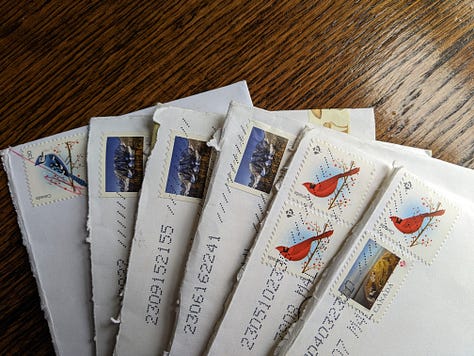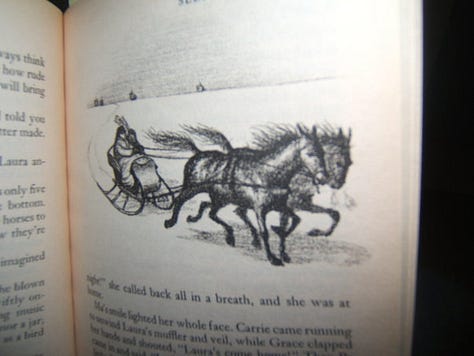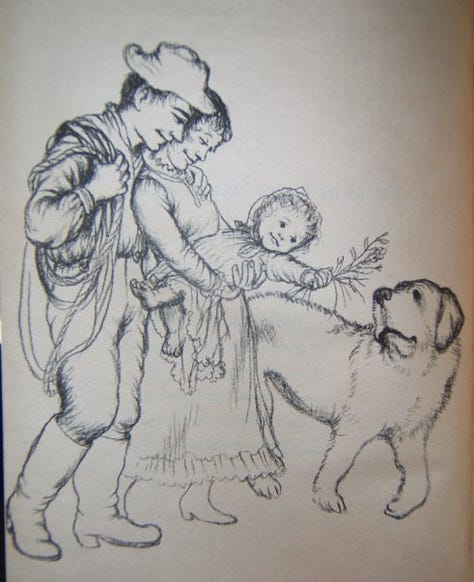2 Feb 2025
Dear Sarah of the Shore,
What a trail of grace your friendship’s been these recent years. I’ve looked back through your earliest letters and messages to see if I’d already written you about a certain someone, and instead found a trove of love stuffed in each envelope addressed to The Anchorage.
How I love places. Reading about them. Writing about them. Shires, secret gardens, distant solar systems, and perhaps most of all, the prairie as seen through the eyes of pioneer Laura Elizabeth Ingalls Wilder. Her birthday is this week. A few years ago we celebrated her 150th with sleigh rides and mulled cider at the museum site of the log cabin where she was born.
Despite my refusal of smartphones and ebooks, my embrace of line-dried laundry and hand-ground coffee and snail mail and woodburning stoves, I am grateful to’ve been born when I was, post the discovery of insulin, without which my husband would not be alive. And yet, I don’t think I’ll ever lose my love for horse-drawn wagons and one-room schoolhouses. Laura wrote little of her greatest grief, the loss of an infant, and yet, overwhelming as those waves must have been, she made a vivid record of grasshoppers and kittens and leeches and plummeting temperatures. She watched and bore witness to the concrete details of her everyday life—the crayfish chasing bare toes, the Christmas ham that stayed frozen until May, Pa’s fiddle, Mary’s piano, and dear, dear old Jack. My mom read the books aloud to us as kids, and I’ve reread them over and over since. Prairie stories sank down into me, and stirred mine up.



Laura is a writer who makes me want to write because she looked outward. She gave an account of what she saw. In part to describe things for her blind sister, but I think she needed to describe them for herself, too. She left out her deepest sorrows, and she sometimes laughed at meanness and sided with fear, as do I. Even so, she taught me to take notice of tools and people and weather. She inspires me to welcome my daily chores with the indomitable joy of getting to tell a story about them later. She makes me want to look at the life unfolding before me and really see it and name it and share it. She loved her place bravely. She gave thanks for its goodness. Those are qualities I want to imitate.
Her glimpses into the past have affected my sense of scale and severity. It isn’t that today’s blizzards and plagues are any milder, it’s that when they come I am less alone in history. Her act of narration doesn’t de-catastrophize events, but puts them into a more expansive story arc. Though her frontier feels smaller, it also feels larger. And in our era where air conditioning buffers me from the dirt floor and sod roof and the entrails of butchering (priestly work now replaced by roadkill), in hers, death is as close as ever, and fear, farther away. Thanks to Laura, I look toward holidays in the hope of one precious peppermint stick, knowing the taste will linger for years.
The Ingalls made a home wherever they roamed, and as a youngster I copied them, turning closets and chicken coops and trees and tool sheds into playhouses, filling empty shelves with provisions, furnishing bare floors, foraging my neighborhood, and bringing a small bit of order and flourishing to each corner. In the end, to placemake is to love; to love is to make a place. Not only physically but spiritually as well. We make a place for each other in the letters we write. A place to receive, rest, wonder, wrestle, weep, rage, laugh. I’m thankful for your company across these miles and megabytes (or kilometers and kilobytes 😊). I wish you safe harbor hither and yon, Germany or PEI, Feechiefen or Cair Paravel, your wooded lake shore or my—and Laura’s—prairie.




So beautiful! I love this Reagan.
Yes, you are so good at placemaking. And your writing reminds me that this world of sorrows and joys is also full of wonder and beauty.